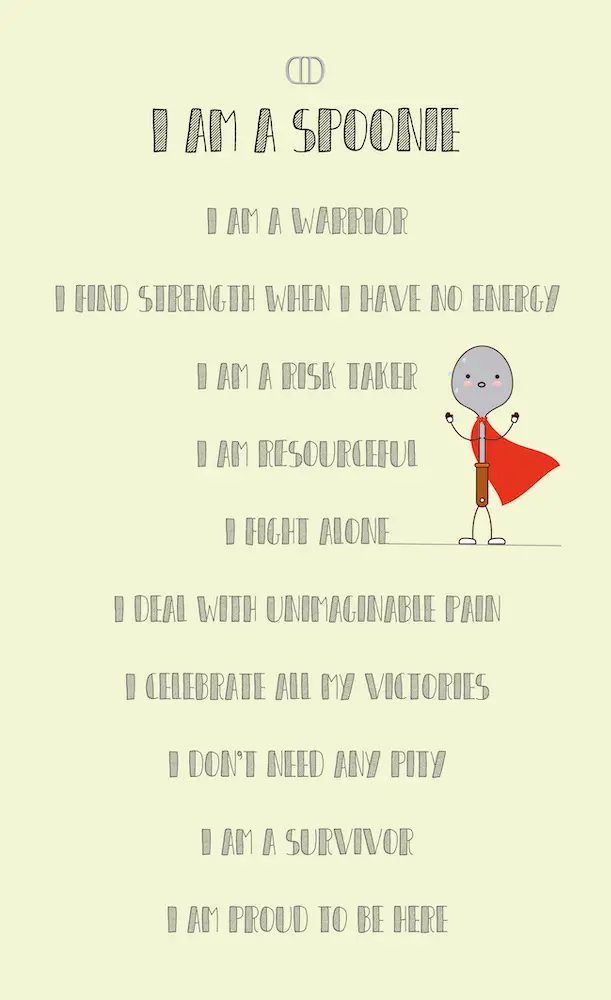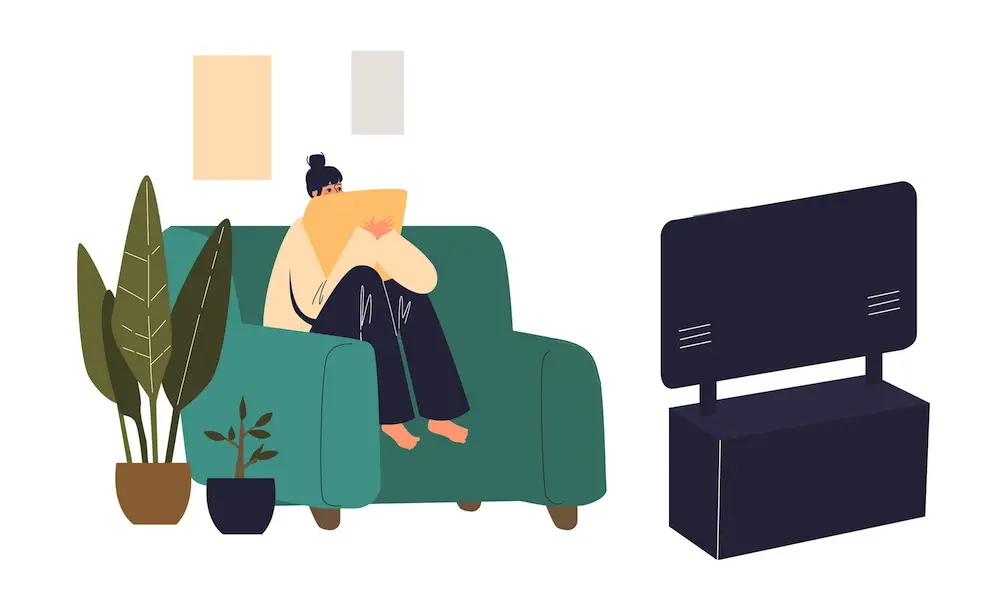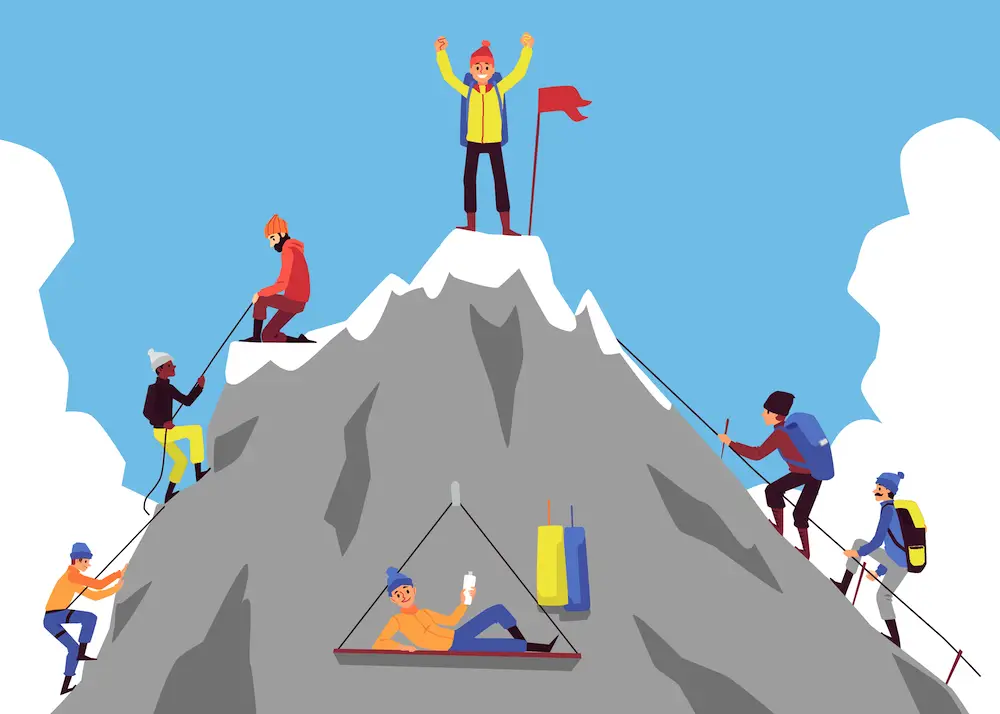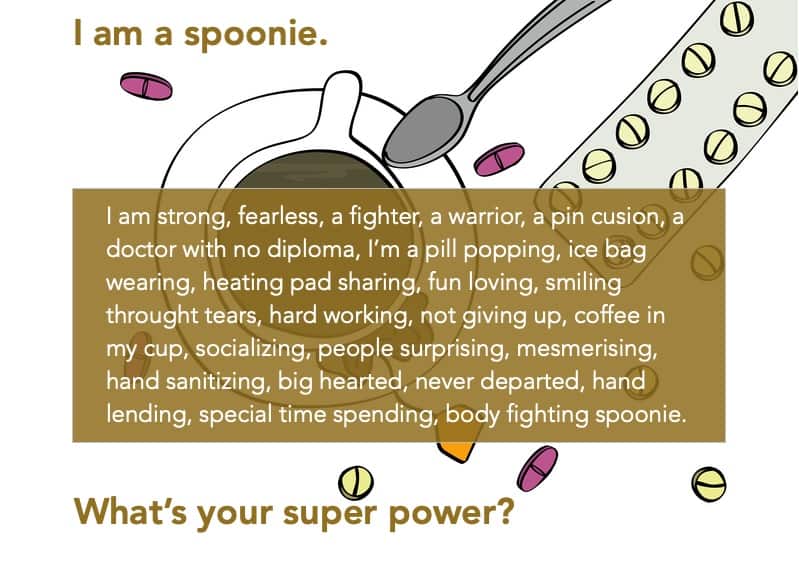As a fellow a chronic illness warrior, you've probably heard the term "spoonie" being thrown around – especially after some digging online. If you've ever wondered what that term means:
A spoonie is a term used to describe someone with a chronic illness. The Lupus blogger Christine Miserandino developed the spoon theory to describe the functional limitations that anyone with a chronic illness will experience, highlighting that someone with a chronic illness must consciously monitor their approach to the same daily tasks that others take for granted.
If you're overwhelmed or lost for words when trying to explain how you feel to your loved ones – STOP! Spoon theory may be the answer. Read this and use our printable charts. It will help you explain your needs, thoughts and movements better to others.
Why Spoon Theory Was Created
The spoon theory was developed by Lupus warrior and award-winning blogger Christine Miserandino. She came up with the spoon theory when one of her friends asked her what it felt like to be sick.
How? By giving her exactly 12 spoons. Christine explained how each spoon gives you enough energy to complete one task that day.
Every time you accomplish a task, it costs you a spoon. If you run out of spoons for the day – that’s it! No more energy to do anything else. And there’s no guarantee on how many spoons you’ll be given for tomorrow.
This concept works so well because it gets non-spoonies to think about how much liberty they have to do many activities during the day – at no expense.
Spoon Theory Charts Are the Best Way to Explain Your Struggle
I always find that analogies are best explained with pictures, and it also makes the activity a little more fun to do.
Here are three spoon theory charts that I created. All are great for you and your loved ones to look at and use.
It’ll help you, as someone with a chronic illness, think about how you use your energy and talk about it to others. And it’ll help your loved ones see things from your point of view so that they can better understand how much your daily life is impacted by your “spoons”.
A Day In The Life of a Spoonie

Making Choices as a Spoonie
This chart allows you to decide how you want to use your own spoons, and what the possible outcome of your decisions may be.

What it Means to be a Spoonie

Spoonies Have Limited Energy
Energy is your most precious commodity as a spoonie. Your body is busy fighting a life-or-death war, and the stress takes it out of you! But people struggle to understand how invisible illnesses affect us. Like me, I'm sure you've been told by others that:
- You don't look sick
- You're not tired – just lazy
- You are faking your symptoms to get out of a responsibility
- You're exaggerating the severity of your problem
- You just need to exercise and eat better for more energy
It's extremely frustrating to try and convey your experience to someone else, which is why the spoon theory comes in handy.
“I explained that the difference in being sick and being healthy is having to make choices or to consciously think about things when the rest of the world doesn’t have to. The healthy have the luxury of a life without choices, a gift most people take for granted,” says Christine in her article.
For example, getting up and going to work does not use one spoon – it uses four!
You can deduct one spoon just by opening your eyes and getting out of bed, another for showering, another for making breakfast, and another for driving to work.
These four things are barely even considered activities for non-spoonies. And until you can convey how much more taxing it is for you to live – no one can start to understand.
Spoonies are Warriors – Step Aside Soldiers

Even if you feel your fight is invisible – your voice is heard here. I know what you're going through because I go through it myself.
A spoonie warrior faces broad issues like mobility, energy levels or accessibility because of their chronic illness. You would never experience or know about these specific challenges if you didn't have a chronic illness.
Every day, wake up and remind yourself that you are a WARRIOR. You are a FIGHTER. You have the deep inner strength to start each day and give it your all, regardless of your limitations.
So I want to remind you that it's okay if you...
- Have perpetual moments of sadness, anger, joy, despair, hope, frustration, and happiness all in one go. It leaves you overwhelmed and ready to ball into tears for no reason. Exhaustion and pain will do this to you.
- You just want to sleep or rest in your free time. Of course, you'd like to see your friends and family – but this can drain all your energy. Napping, reading a book, watching Netflix or ordering takeout are some of the the best things to do during your downtime – with no regrets!
- You choose shoes and clothes for comfort before anything else. Being a spoonie is hard enough to deal with – you don’t need fashion to make life harder. If an item of clothing is practical – there's a much higher chance you'll wear it. I don't think I'll ever give up my Birkenstocks!
But, of course, that doesn't mean you need to look bad. Self-worth is still important. Read this if you need some inspiration: 15 Fool-Proof Fashion Hacks For Chronic Illness - You’re a little forgetful. Okay, you're very forgetful. In fact, you say the words, "sh*t I totally forgot about that" at least ten times a day. My solution is to have a stash of chocolates to hand out as an apology when you mess up big time!
Here's how I recommend coping with forgetfulness: The 9 Best Ways to Clear Brain Fog When You're Chronically Ill - You’re the resident nudist now. You'll only understand what I mean once you've spent the majority of your time stripping for doctors, walking around in hospital overalls and letting others help you get dressed – being naked barely phases you anymore.
Spoonies Are Risk Takers (Even if We Get Burnt)
It's not always easy to know how many spoons you have reserved. So, if we commit to something – we take a HUGE risk in the process because we don't always know how our bodies will react.
- Every time we try something new – it's risky.
- Every time we push ourselves – it's risky.
- Everything we do is a give and take.
For example, if we're lonely, sore, and desperate to see friends, we risk physical depletion for emotional satisfaction.
Sure, you get much more experienced with time. You learn more about your body's limits and realise that you can't just wing it when it comes to plans.
Your energy is precious, and if you run out of "spoons" recklessly, you will have no energy left to do anything that day – this is emotionally and physically painful.
It's easy for spur of the moment decisions to cause a flare up, stop you from doing your daily activities and set back your progress.
Spoonies know it's not just about running out of spoons and needing to rest. It’s about what those spoons allow you to do daily and being aware that there’s no bargaining process involved.
Spoonies Go Through Difficult Times Alone

Most of the time, your spoons get used up pretty quickly, doing normal daily activities like eating and showering. That’s why it gets so hard to manage daily life as a spoonie.
It’s not only hard to control how much you do and how quickly you do it – but it’s hard to see others continue their lives effortlessly in comparison.
Serious energy limits can leave you feeling left out from any social gatherings as you often don’t have enough spoons to even get to them.
And it can be discouraging when it takes you three times longer to complete a task than it would anyone else because of how much rest you need to recuperate.
Whether we cancel plans, leave early, forget commitments or go silent for three weeks – it eats us up inside. Please know that socialising is draining. And when our pain is unbearable, it’s hard to do anything but try to make it through the day.
I've felt lonely too at the best of times, and there are a few ways I've learnt to cope with it. I share it all here: Chronic Illness and Learning to Cope with Loneliness
Guilt Often Overwhelms Spoonies
You’ve had a heavy day, you’ve run out of spoons, and you lie down for a nap – but it’s only 11am.
All of a sudden, you start to doubt yourself, “Wait… is it because I’m sick or am I just lazy?”
You spend so much time trying to prove to others how unwell you are that eventually, their words can ring little holes of insecurity into our minds.
This kind of guilt can be all-consuming. You want to be more proactive, but all you can muster the energy to do sometimes is rest. Moments like these can have a spiral effect on your conscience because it makes you realise how much you rely on others too.
Then you start to feel guilty about what your condition means for the people that love you.
If you’re struggling with guilt right now, I understand! It's something that I have struggled with a lot myself. I know how awful it feels to rely on others or feel like you’re causing them unnecessary stress.
But here's the thing: These are the cards you were dealt – you didn’t choose this life. So you can’t let such draining emotions consume you when you’ve got a much bigger fight ahead of you.
This is a must-read article on coping with guilt if you’d like some pointers on how to make practical steps forward right now: Overcoming Guilt and Chronic Illness.
Spoonies Are Resourceful

The longer you have a chronic illness – the more prepared you learn to be for absolutely anything. You need to be scrappy, resourceful and adaptive to make it through any day.
For example:
- You do as many medical treatments from home as possible to lower costs and stay out of the damn hospital. You can see me doing a little microcurrent therapy to soothe my overactive nervous system in the photos above.
My therapist used this machine on me, and it worked so well that I decided to research it. It turns out it’s a user-friendly device that’s cheaper to just buy and use at home – so I did! - You’re the go-to person for anyone who needs over-the-counter meds on demand. Headache, heartburn, gastro or fever – you name it! You probably have it stored in one of your medication boxes.
- You now have your own flare starter kit that comes with you wherever you go – no more issues at work or while you travel if you can avoid them.
Heat pads, chilled music, neck cushion, socks, blankets, comfy clothes, Netflix, tea & furry family members usually fall into this. Here's my Ultimate Flare Survival Kit for Chronic Illness if you need a little inspiration.
Pain and Exhaustion Make Spoonies Grumpy
We’re sorry when we get grumpy and emotional – but wouldn’t you feel the same way if you were in our shoes?
Our pain is extreme, it’s vivid, and it doesn’t go away. It's unlike anything you could ever describe. So, it's easy to lose sight of what's important in bad moments and snap! We don't mean it, but we're hurting.
I don't know how many times I've screamed and cried over moments where I can't tie my shoelaces, or I drop a mug because of a muscle spasm. When such simple tasks feel monumental, you question your capabilities and even your worth – it's hard!
Of course, it doesn't help when you're also getting no sleep and constantly taking medication.
The best thing to do in these moments (as a non-spoonie) is to help us feel like we're being heard (without pity, please). Heck – break a mug too and show us that these things can happen to anyone – but life carries on for the better.
Spoonies Need to Know How to Celebrate Small Victories

Being a survivor means adapting to your surroundings. It means changing your goals and refocusing your attention on new priorities.
We don't discriminate against achievements or victories anymore. Anything that feels worth celebrating – trust me, we'll do it!
If you've successfully managed to shower and put your bra on that day – it's perfectly normal to throw your arms in the air and say "YES" under your breath.
If you've cooked dinner and enjoyed the process without falling over from exhaustion – chances are you'll be giddy all through that meal.
By the way, here are my favourite cooking cheat sheets for spoonies: 14 Energy-Saving Cooking Tips If You're Chronically Ill (Free Printable Cooking Cheat Sheets)
Everything you achieve is a blessing, it's a sign of growth, and you MUST celebrate it.
Spoonies Hate Pity – Don't Look At Us With Sad Eyes!
Although showing empathy is really important, saying things like, "wow, your life is awful" is not helpful in the slightest.
Just like me, I'm sure you've had people say this to you or give you such sad eyes that you know what they're thinking.
We spend all day trying to motivate ourselves and strengthen our minds – so let’s focus on the good, which is helpful and not the bad, which makes us feel awful.
Spoonies are survivors. We make our lives work for us to the best of our ability. Yes, we do experience a great deal of happiness regardless of our health.
So help us create more good moments and not focus on the things that limit us.
Spoonies Are Too Hard on Ourselves
This is something all spoonies are guilty of – we're hard on ourselves no matter how irrational we're being.
We always seem to talk ourselves into believing that we're not:
- Doing enough
- Trying hard enough
- Worth enough
So here's what you need to remember:
- Every spoonie is different, so don’t compare yourself.
The way you cope with your condition will not be the same as anyone else because no two people experience pain in the same way or have the exact same symptoms and lifestyles.
- You’re fighting an invisible battle – it’s exhausting.
No one may see the true extent of what you’re going through, but that doesn’t mean it’s not happening. When you have a lot less energy than others at work or home – remember to be your own cheerleader. - You haven’t asked for this life.
It feels awful when you need help from your loved ones or find that you are dependent on them for survival. But this is an extreme situation that needs extreme action.
Remember that your friends and family love you and want to help you in any way they can, especially since there’s no cure. If the tables were turned – you would do the same to help them.
Spoonies Need Your Love and Support
If you want to help a spoonie – medical advice isn't the best way to go about it. We are inundated with suggestions all the time, but at the end of the day, what we feel is that no one understands us anymore.
Here are two points to remember:
- We know you want to say positive things to us, but some of these words do more damage than good.
Saying things like, “but you don’t look sick”, just reminds us of how hard we had to fight to prove our pain was real in the first place.
If you want to tell us that we look well, just say: “I can see how hard you’re fighting and your strength shows.” - If you want to help us and don’t know how – hugs and wishes are the best.
Knowing you’re there for us is the best support we could ever ask for. And if you want to get us an actual gift – a drug store gift voucher is the best thing ever. (Being a spoonie is expensive.)
Remember that your friends and family love you. Still, this unusual and challenging circumstance can get frustrating for everyone involved, especially because we all have our own ways of coping with stress.
A little compassion from both you, as the spoonie, and your loved ones, will go a long way if you start to communicate more honestly with one another.
If you need some help explaining to your loved ones exactly what type of help you need, this will help you a lot: How Do You Care For Someone With a Chronic Illness?
Spoonies Can Laugh at Themselves – Here Are Some Memes
When something is relatable – memes will be made about it. This includes the trials of being a spoonie!
One of the reasons I love sharing these snippets is because it helps us giggle and remember we’re not alone right now.
So to end off this article, I thought I’d show you 11 of my favourite spoonie memes that are too good not to share.








See if you can finish the sentence “you know you’re a spoonie when…” it’s a really fun activity that releases your frustrations and can have you chucking for hours.
If you have anything relatable that you’d like to share with the spoonie community – I’d love to hear it.
Have a wonderful day and stay happy!

